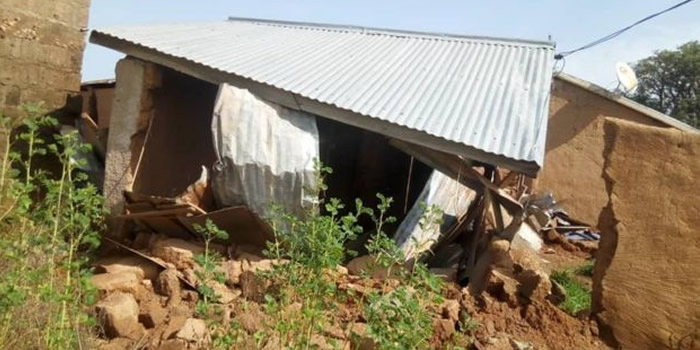Adverts
ENVIRONMENT
Rainstorm destroys economic trees at Nabdam
Rainstorm that hit Zanlerigu and other communities in the Nabdam District of the Upper East Region, has destroyed economic trees and ripped up the roofs of some houses.

Date Created : 5/9/2023 12:00:00 AM : Story Author : Ghanadistricts.com
The trees, including Shea, Dawadawa and Baobab among others had their branches destroyed and some completely uprooted.
At the Gane community for instance, the media could count more than 10 Shea trees that were completely uprooted.
Pelungu, Gundork, Yekote and parts of the Logre communities had similar experiences.
Acacia and other trees were not spared as the Zanlerigu Junior High School had two of its trees completely uprooted and the branches of others destroyed.
Many locals, especially the women, rely heavily on these economic trees to generate income to support their families through the sale of Shea nuts, dawadawa and the leaves and fruits of the Baobab.
According to accounts by some inhabitants, the loss of some of the trees threatened their livelihood as they depended on them for food and income.
Mrs. Yenmah Bugbire, a resident, while expressing her disquiet over the occurrence, highlighted its impact on women.
“Women rely on these trees heavily as our source of income and any destruction of these trees has a direct impact on us even if it has to do with one single Shea tree because one Shea tree can produce bags of Shea nuts and we only hope this disaster will not repeat itself”.
Although it may have appeared to be a natural disaster, many locals believed the devastation had to do with climate change engineered by the activities of man.
Mr. Mba Kolog, a 53-year-old farmer said “there have been instances, where we lost trees through rainstorm in this community but not to this extent, such that one could count up to 10 trees in just one locality and this exposes how we have destroyed our vegetation cover”
“Deforestation is what has paved way for this kind of storm, and it may just be a tip of the iceberg if we don’t stop destroying the Nangodi and Sakoti forest which otherwise could have minimized these kinds of disasters”, he added
Mr. Yamga Zure, a resident, noted that the continuous cutting down of trees for firewood, charcoal and for building purposes contributed to the storm.
“The cause of this rainstorm typically has to do with our activities of cutting down trees for our parochial interest without planting. Our neighborhood is gradually becoming like a desert and if care is not taken the worst will happen to us because the trees available can’t contain the wind any longer”, he said.


 facebook
facebook X (twitter)
X (twitter) Youtube
Youtube +233 593 831 280
+233 593 831 280 0800 430 430
0800 430 430 GPS: GE-231-4383
GPS: GE-231-4383 info@ghanadistricts.com
info@ghanadistricts.com Box GP1044, Accra, Ghana
Box GP1044, Accra, Ghana